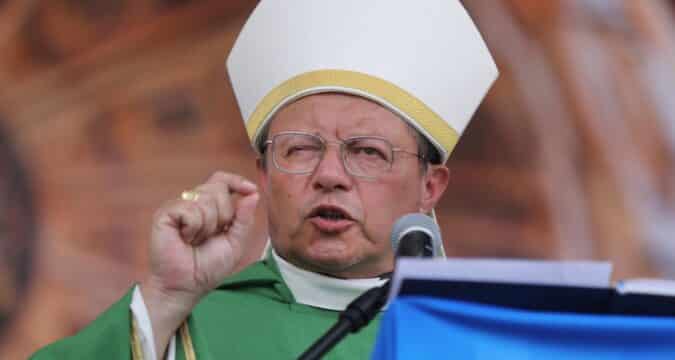
WARSAW (OSV News): Grzegorz Cardinal Rys of Łódź, Poland, responded to concerns following controversial remarks made by two retired bishops about migration and border policies at the Marian shrine of Jasna Góra in July. In a pastoral letter read in all parishes of the Archdiocese of Łódź on July 20, he called for a “conversion of language” in the migration debate, emphasizing the importance of “the language of Jesus.”
He did not directly address the statements made by Bishop Wiesław Mering of Włocławek and Bishop Antoni Długosz of Częstochowa, who had issued warnings about the threats posed by immigration to Poland’s borders. The Polish Ministry of Foreign Affairs protested these views officially.
During the Call of Jasna Góra evening prayer on July 11, Bishop Długosz commended the “Defenders of the Border” movement, a nationalist group patrolling Poland’s western frontier. He expressed fears regarding “the Islamisation of Europe” and voiced concerns about “hundreds of thousands of migrants flooding into Poland.” He argued that accepting illegal migrants contradicts Poland’s interests and does not align with the principle of mercy.
On July 13, Bishop Mering reiterated these concerns during an evening Mass for the Radio Maryja Family pilgrimage, claiming that illegal immigration threatens Poland’s borders.
The bishop criticised the Donald Tusk-led government for fostering friendly relations with Germany, stating, “We are ruled by people who describe themselves as Germans.” He quoted Polish poet, Wacław Potocki, stating, “As long as the world exists, a German will never be a brother to a Pole,” which elicited applause from attendees.
Reacting swiftly, the Polish government on July 15, through its Ministry of Foreign Affairs, delivered a diplomatic note through its ambassador to the Vatican, to the head of Protocol of the Holy See to express discontent, condemning the bishops’ comments as contrary to the agreement between Poland and the Vatican.
The ministry said that their statements violated the principles of human dignity and Poland’s sovereignty, warning that such views could threaten the nation’s foreign relations and internal stability.
In his pastoral letter, Cardinal Rys lamented that “hate, fear of the ‘foreigner,’ and stereotypes” had become more prominent than compassion and Christian values in discussions about migration. He cited Catholic social teachings, emphasising that “EVERY PERSON has the right to choose where to live,” distinctly highlighting this point in capital letters.
Amid increasing tensions over immigration issues, especially with Germany’s policy of returning migrants who crossed the border illegally, Poland reintroduced border controls on July 7, despite being part of the Schengen Area.
Other bishops shared their views amid these tensions. Archbishop Józef Kupny of Wrocław reminded the faithful of the anniversary of the historic Polish bishops’ letter to German bishops, which called for reconciliation and included the phrase, “We forgive and ask for forgiveness.” Signed by prominent figures like Stefan Cardinal Wyszyński and Karol Cardinal Wojtyła—later Pope St. John Paul II—this letter marked a crucial moment in post-war reconciliation between Poland and Germany.
Tomasz Krzyżak, a journalist for the Rzeczpospolita newspaper expressed that the government’s reaction to the bishops’ remarks was disproportionate. He acknowledged that while they crossed a line, the notion of a conflict between Church and state is exaggerated.
Krzyżak suggested that Jasna Góra should remain free from political disputes, even in a context where faith, identity, and politics are intertwined.
Cardinal Rys characterised the controversies as having “little to do with Christianity” and threatening “truly gospel-oriented” initiatives like support for Ukrainian refugees through Caritas. He concluded by stating that the prevailing discourse harms newcomers and undermines the efforts and motivations of those wishing to assist them.








